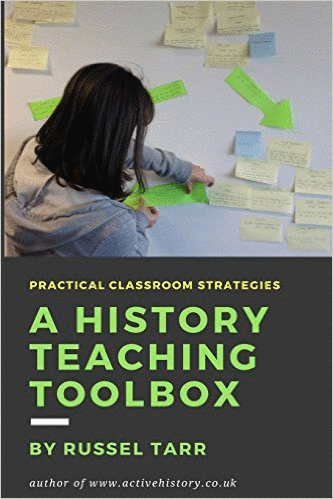Transform your history classroom
ActiveHistory provides educational, award-winning interactive simulations, decision-making games, self-marking quizzes, high-quality worksheets and detailed lesson plans for the school history classroom. All resources have been designed by full-time history teacher Russel Tarr.
An ActiveHistory subscription provides everything you need to construct and deliver a History course from start to finish for the entire 11-18 age range!
These consist not just of lesson plans, worksheets and teacher notes, but also multimedia lectures and interactive games and historical simulations ideal for remote learning and self-study.
World History teaching resources for the high school classroom: lesson plans, worksheets, quizzes and simulation games for KS3, IGCSE, IB and A-Level teachers.
Were the Peace Treaties of 1919-23 fair?

Note: Full and comprehensive teaching materials for this topic can be found on the ActiveHistory section for this topic
From the syllabus
Focus Points
What were the motives and aims of the Big Three at Versailles?
Why did all the victors not get everything they wanted?
What was the impact of the peace treaty on Germany up to 1923?
Could the treaties be justified at the time?
Specified Content
The peace treaties of 1919-23: the roles of individuals such as Wilson, Clemenceau and Lloyd George in the peacemaking process, the impact of the treaties on the defeated countries, contemporary opinions about the treaties.
Past Questions
| 2016 Nov (region 3) | 2016 Nov (region 2) | 2016 Nov (region 1) | 2016 June (region 3) | 2016 P1 June (region 2) | 2016 P1 June (region 1) | 2015 Sample paper 1 | ||
| Peace Treaties | a [4 marks] | What features of the Treaty of Versailles were shared by the other peace treaties of 1919–20? |
What were the territorial terms of the Treaty of Saint Germain? | Describe the restrictions imposed on the German land forces by the Treaty of Versailles. |
What was decided about the Saar in the Treaty of Versailles? |
What were the effects of the Treaty of Trianon on Hungary? |
What did Wilson hope to achieve from the peace settlement of 1919–20? | |
| b [6 marks] | Why were the German people unhappy with the Treaty of Versailles? |
Why was the work of the peacemakers at the Paris Peace Conference difficult? |
Why was the Treaty of Sèvres replaced by the Treaty of Lausanne? |
Why was the Treaty of Sèvres renegotiated? |
Why did Wilson believe his ‘Fourteen Points’ should form the basis of the Treaty of Versailles? |
Why did Clemenceau and Lloyd George disagree over how to treat Germany? | ||
| c [10 marks] | Who was more satisfied with the Treaty of Versailles: Clemenceau or Lloyd George? | ‘German hatred of the Treaty of Versailles was justified.’ How far do you agree with this statement? | How satisfied were the French people with the Treaty of Versailles? | ‘The Germans had genuine grounds for complaint about the Treaty of Versailles.’ How far do you agree with this statement? | How far did the peace settlement of 1919–20 reflect the aims of Clemenceau? | ‘The Treaty of Versailles was a fair settlement.’ How far do you agree with this statement? |
Classroom activities
The Treaty of Versailles Online Role-Play Simulation
An artificial intelligence simulation, complete with worksheets. Students choose which member of the Big Three to be in role as, and then try their best to obtain their objectives over a series of rounds of negotiations. A good way of rounding the unit off, introducing it, or revising it!
Cartoon Analysis
Analyse a series of cartoons by hovering over details and answering exam-style questions. When you have finished, the computer will provide you with a printout comparing your answer to a model answer. A great way to revise and develop sourcework skills.
Interactive Revision Quizzes
Fling the Teacher Quiz

Ideal for a starter activity. Outline the main task for the day at the beginning of the lesson. Then, give students 10 minutes to play the game. Anyone finishing within the 10 minutes should get points reflecting the amount of minutes left on the clock, then move directly on to the main task for the lesson whilst the rest of the class continue to play.
Repeat this format for ALL your revision lessons to create a "Revision Leaderboard" with a prize given to the overall high score at the end of revision time.
Keyword Challenge
Put students into teams of 4 or 5. The first member of the first team sits in the "hotseat" with their back to the interactive whiteboard. The teacher uses the "Random Word Picker" at www.classtools.net to choose and display a word at random on the interactive whiteboard. The rest of the team have 30 seconds to get their teammate to guess what word is on the screen behind them by giving a definition. A correct guess gets points for the team based on how many seconds are left on the clock (e.g. 25 points if they get it after 5 seconds). The teacher should then provide a short outline of the significance of the term, and all students should make a note of it. Repeat for the other teams, and carry on for as many rounds as you like! A prize can be given to the highest-scoring team at the end of the game, and scores can be added to the Revision Leaderboard if you are using one.
IGCSE Revision: Homepage

© 1998-2025 Russel Tarr, ActiveHistory.co.uk Limited (Reg. 6111680)
1 Torrin Drive, Shrewsbury, Shropshire, SY3 6AW, England
Privacy Policy | Contact






